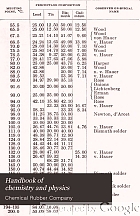Find Articles by Citation
-
Citation LinkerWhat usually happens is either someone gives you the citation information for an article and tells you to find it, you come across a reference to another article in one your currently reading, or you find an article on the open web. Use our citation linker to check if we own the article somewhere in a library database.
Get Articles We Don't Own
-
Interlibrary LoanNeed an article that we don't have at SU? Order it for free through Interlibrary Loan! Give yourself 2-4 days for articles and several weeks for books.
-
Request Books from other USMAI SchoolsLogin with your GullNet credentials to access books from other University of Maryland schools! Books usually arrive in about a week, much faster than traditional ILL.
Library Print Books
-
 CRC Handbook of Chemistry and Physics
Call Number: Reference QD65 .H3 2013-14Publication Date: 2013-2014This title is located in our Reference collection on the first floor. It is not available for check-out, and may only be used in the library.
CRC Handbook of Chemistry and Physics
Call Number: Reference QD65 .H3 2013-14Publication Date: 2013-2014This title is located in our Reference collection on the first floor. It is not available for check-out, and may only be used in the library. -
The Merck Index by
Call Number: Reserves: RS51 .M4 2013ISBN: 9781849736701Publication Date: 2013-04-30This title is on reserve and can be found at the Circulation Desk under the faculty name 'Habay, Stephen'.
Other chemistry books available for checkout are found on the 3rd floor stacks in the QD section. We also have many chemistry textbooks on reserve at the library service desk. These textbooks may be useful for your review even if you've already completed the course.
Library and Chemistry




Why all this emphasis on research? According to the American Chemical Society:
A student who intends to become a practicing chemist, or who will use chemistry in allied fields of science and medicine, should know how to use the chemical literature effectively and efficiently. Access to the chemical literature has traditionally used print resources extensively; these days however instruction in chemical information skills is likely to rely heavily on on-line resources and access and instruction in those resources is critical to the training of any chemist. There are a variety of specific skills of importance in the successful use of the chemical literature. For example, students should be able to:
- Efficiently locate chemical and physical properties of substances, including spectra
- Efficiently locate references for the detection, characterization, or reactions, including syntheses, of desired compounds or classes of compounds
- Be able to obtain information on a substance through a variety of searching strategies, including structure searching, and searching by molecular formula and name
- Identify key references and use citation searching of articles to locate more current articles on the topic of interest
- Complete a comprehensive subject search
- Compile a complete bibliography of an author's publications
- Locate recent review articles on a subject
- Know the importance of patents and be able to search for patents on a subject
- Use a bibliographic program to organize information and prepare a scientific paper. Instruction should also be provided in data management and archiving, record keeping (electronic and otherwise), and managing citations and related information. This includes notebooks, data storage, and information management and formatting.